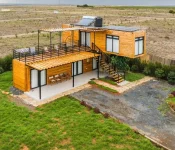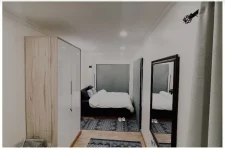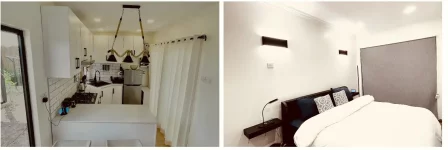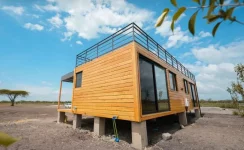Jimmy Gathu
New Lister
Container Houses- what you need to know.

Due to growing need for alternative housing structures and materials, shipping containers have become very common for habitable and commercial spaces. Container houses can also be in form of a welded structure with galvanized steel structure, which can be prefabbed in the factory and assembled on site- Not necessarily a Shipping Container. With a team of engineers and technicians shipping containers can be made to suit different products based on customer needs.
USAGE
Companies and organizations may create Container Site Offices, meeting rooms, Container classrooms, accommodation units, senior suites, ablution blocks, kitchens, dining areas, laundry, clinics, security booths, stores, reefers, workshops and many other, as per clients’ requirements. In Private Sector containers can be fabricated into shopping centers, Container Commercial stalls, Container Structures, fast food restaurants, coffee shops, butcheries, barber shops, classrooms, schools, and even clinics.
COSTING
Containers come in sizes of 20ft or 40ft, and are either dry or refrigerated. A used 20ft container is approximately KSH.300, 000 and KSH. 450,000 for a 40ft container, as is, where is. Delivery fee for a 40ft container within Nairobi – around KSH 25,000 to KSH 30,000. The fabrication cost and materials plus consultation fees is more or less equivalent to the cost of the container, but will depend largely on intended use. Therefore, with about KSH. 900,000, one has a descent modified unit of 40ft container to suit their needs. Note this costs does not cover any internal space enhancements like Thermoregulation or Soundproofing. The Cost of a Container space can vary a lot depending on the finishing materials chosen, insulation and sound-proofing required. The more sophisticated these needs are, the more the cost and vice versa.
Advantages and Disadvantages of Container Units
Pros: Notable advantages include;
There are many successful container developments that are setting top-notch standards and class.
1. The Dreamwood Nanyuki Home by ISM HOMES CONTAINER TECHNOLOGY
Set at the base of the majestic Mt. Kenya, this extraordinary two-bedroom container home redefines eco-luxury living. Built in just three months with meticulous attention to detail, this architectural masterpiece harmoniously blends modern comfort with the unspoiled beauty of the Kenyan wilderness. Thoughtfully designed across two levels, the home radiates a sense of serenity and spaciousness.
The home features two elegantly designed bedrooms, each with a private ensuite bathroom, creating a sanctuary of relaxation and privacy. Its open-plan living area effortlessly merges the indoors with the breathtaking outdoors, immersing you in the surrounding natural beauty. The crowning jewel of this remarkable dwelling is the stunning rooftop deck—a perfect spot to take in the essence of Kenya's spectacular landscape.



2. Isinya Villas: Designed using two 40ft containers, this stunning 60 sqm space seamlessly combines efficiency and elegance. The home boasts two ensuite bedrooms, a welcoming open-plan living and dining area, a spacious upstairs balcony terrace, and a charming downstairs wooden patio with a roof covering. Large aluminum windows and doors fill the interiors with natural light, while the inclusion of a modern breakfast bar enhances convenience. With premium finishes throughout, from the bedrooms to the living spaces, this home redefines contemporary living in Isinya.

Where to Shop!
Some Notable companies offering container building solutions in Kenya include:
ISM Homes Container Technology & Container Works Africa
Due to growing need for alternative housing structures and materials, shipping containers have become very common for habitable and commercial spaces. Container houses can also be in form of a welded structure with galvanized steel structure, which can be prefabbed in the factory and assembled on site- Not necessarily a Shipping Container. With a team of engineers and technicians shipping containers can be made to suit different products based on customer needs.
USAGE
Companies and organizations may create Container Site Offices, meeting rooms, Container classrooms, accommodation units, senior suites, ablution blocks, kitchens, dining areas, laundry, clinics, security booths, stores, reefers, workshops and many other, as per clients’ requirements. In Private Sector containers can be fabricated into shopping centers, Container Commercial stalls, Container Structures, fast food restaurants, coffee shops, butcheries, barber shops, classrooms, schools, and even clinics.
COSTING
Containers come in sizes of 20ft or 40ft, and are either dry or refrigerated. A used 20ft container is approximately KSH.300, 000 and KSH. 450,000 for a 40ft container, as is, where is. Delivery fee for a 40ft container within Nairobi – around KSH 25,000 to KSH 30,000. The fabrication cost and materials plus consultation fees is more or less equivalent to the cost of the container, but will depend largely on intended use. Therefore, with about KSH. 900,000, one has a descent modified unit of 40ft container to suit their needs. Note this costs does not cover any internal space enhancements like Thermoregulation or Soundproofing. The Cost of a Container space can vary a lot depending on the finishing materials chosen, insulation and sound-proofing required. The more sophisticated these needs are, the more the cost and vice versa.
Advantages and Disadvantages of Container Units
Pros: Notable advantages include;
- Saving in time, labour, materials and overall cost- The construction cycle is shortened by 80% compared to traditional buildings, the construction labour is saved by 70%, the construction water is reduced by 70%, and the comprehensive energy saving exceeds 50%.
- It is easy to install, easy to disassemble and there will be no construction waste left while installation or disassembly.
- There is no construction waste during the installation process.
- It is easily movable and reusable.
- Good temporary residence in disaster rescue, such as in case of mass displacement of people caused by natural calamities like floods and landslides.
- They are flexible and can be customized to personal preference
- Containers are made of steel, which requires a lot of thermoregulation to maintain desired internal environment.
- Usually they are limited in space- Usually small.
There are many successful container developments that are setting top-notch standards and class.
1. The Dreamwood Nanyuki Home by ISM HOMES CONTAINER TECHNOLOGY
Set at the base of the majestic Mt. Kenya, this extraordinary two-bedroom container home redefines eco-luxury living. Built in just three months with meticulous attention to detail, this architectural masterpiece harmoniously blends modern comfort with the unspoiled beauty of the Kenyan wilderness. Thoughtfully designed across two levels, the home radiates a sense of serenity and spaciousness.
The home features two elegantly designed bedrooms, each with a private ensuite bathroom, creating a sanctuary of relaxation and privacy. Its open-plan living area effortlessly merges the indoors with the breathtaking outdoors, immersing you in the surrounding natural beauty. The crowning jewel of this remarkable dwelling is the stunning rooftop deck—a perfect spot to take in the essence of Kenya's spectacular landscape.



2. Isinya Villas: Designed using two 40ft containers, this stunning 60 sqm space seamlessly combines efficiency and elegance. The home boasts two ensuite bedrooms, a welcoming open-plan living and dining area, a spacious upstairs balcony terrace, and a charming downstairs wooden patio with a roof covering. Large aluminum windows and doors fill the interiors with natural light, while the inclusion of a modern breakfast bar enhances convenience. With premium finishes throughout, from the bedrooms to the living spaces, this home redefines contemporary living in Isinya.

Where to Shop!
Some Notable companies offering container building solutions in Kenya include:
ISM Homes Container Technology & Container Works Africa
Last edited:
